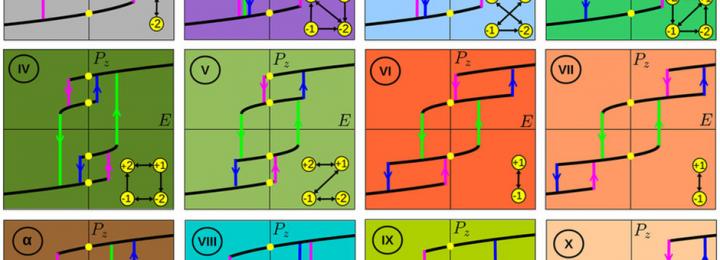New study of ferroelectrics offers roadmap to multivalued logic for neuromorphic computing

A team of researchers from Argonne, the Lille University of Science and Technology and the University of Picardie Jules Verne have laid out a theoretical map to use ferroelectric material (a class of materials whose polarization can be controlled with electric fields) to process information using multivalued logic -- a leap beyond the simple ones and zeroes that make up our current computing systems that could let us process information much more efficiently. The diagram shows the configurations (yellow dots) where stable energy positions could allow us to encode information in thin films of ferroelectric material. Credit: Baudry/Lukyanchuk/Vinokur
The language of computers is written in just two symbols — ones and zeroes, meaning yes or no. But a world of richer possibilities awaits us if we could expand to three or more values, so that the same physical switch could encode much more information.
“Most importantly, this novel logic unit will enable information processing using not only “yes” and “no”, but also “either yes or no” or “maybe” operations,” said Valerii Vinokur, a materials scientist and Distinguished Fellow at the U.S. Department of Energy's Argonne National Laboratory and the corresponding author on the paper, along with Laurent Baudry with the Lille University of Science and Technology and Igor Lukyanchuk with the University of Picardie Jules Verne.
This is the way our brains operate, and they're something on the order of a million times more efficient than the best computers we've ever managed to build — while consuming orders of magnitude less energy.
“Our brains process so much more information, but if our synapses were built like our current computers are, the brain would not just boil but evaporate from the energy they use,” Vinokur said.
While the advantages of this type of computing, called multivalued logic, have long been known, the problem is that we haven't discovered a material system that could implement it. Right now, transistors can only operate as “on” or “off,” so this new system would have to find a new way to consistently maintain more states — as well as be easy to read and write and, ideally, to work at room temperature.
Hence Vinokur and the team's interest in ferroelectrics, a class of materials whose polarization can be controlled with electric fields. As ferroelectrics physically change shape when the polarization changes, they're very useful in sensors and other devices, such as medical ultrasound machines. Scientists are very interested in tapping these properties for computer memory and other applications; but the theory behind their behavior is very much still emerging.
The new paper lays out a recipe by which we could tap the properties of very thin films of a particular class of ferroelectric material called perovskites.
According to the calculations, perovskite films could hold two, three, or even four polarization positions that are energetically stable — “so they could 'click' into place, and thus provide a stable platform for encoding information,” Vinokur said.
The team calculated these stable configurations and how to manipulate the polarization to move it between stable positions using electric fields, Vinokur said.
“When we realize this in a device, it will enormously increase the efficiency of memory units and processors,” Vinokur said. “This offers a significant step towards realization of so-called neuromorphic computing, which strives to model the human brain.”
Vinokur said the team is working with experimentalists to apply the principles to create a working system.
###
The study, titled “Ferroelectric symmetry-protected multibit memory cell,” was published February 8. Research was supported by the U.S. Department of Energy Office of Science (Materials Science and Engineering Division) and the European Commission.
Argonne National Laboratory seeks solutions to pressing national problems in science and technology. The nation's first national laboratory, Argonne conducts leading-edge basic and applied scientific research in virtually every scientific discipline. Argonne researchers work closely with researchers from hundreds of companies, universities, and federal, state and municipal agencies to help them solve their specific problems, advance America's scientific leadership and prepare the nation for a better future. With employees from more than 60 nations, Argonne is managed by UChicago Argonne, LLC for the U.S. Department of Energy's Office of Science. The U.S. Department of Energy's Office of Science is the single largest supporter of basic research in the physical sciences in the United States and is working to address some of the most pressing challenges of our time.
For more information, visit the Office of Science website.
Media Contact
All latest news from the category: Materials Sciences
Materials management deals with the research, development, manufacturing and processing of raw and industrial materials. Key aspects here are biological and medical issues, which play an increasingly important role in this field.
innovations-report offers in-depth articles related to the development and application of materials and the structure and properties of new materials.
Newest articles

“Nanostitches” enable lighter and tougher composite materials
In research that may lead to next-generation airplanes and spacecraft, MIT engineers used carbon nanotubes to prevent cracking in multilayered composites. To save on fuel and reduce aircraft emissions, engineers…

Trash to treasure
Researchers turn metal waste into catalyst for hydrogen. Scientists have found a way to transform metal waste into a highly efficient catalyst to make hydrogen from water, a discovery that…

Real-time detection of infectious disease viruses
… by searching for molecular fingerprinting. A research team consisting of Professor Kyoung-Duck Park and Taeyoung Moon and Huitae Joo, PhD candidates, from the Department of Physics at Pohang University…





















